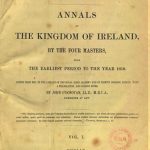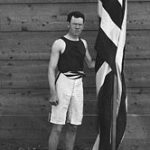Today, when we hear of the intransigence of some extremists in Northern Ireland, it may help to look at where we were just 40 years ago this month and realize how far we’ve come. Back in 1973, the Nationalist command structure in Belfast was losing the support of people once sympathetic to their cause. It was as a result of the slanted coverage distributed by the British-controlled press to the media around the world. Even the people in the Republic to the south were being insulated from the true story and, as a result, had lost much of their enthusiasm for the cause. Reports of IRA … [Read more...] about Forty Years Ago
Glencoe
William of Orange defeated King James II at the Battle of the Boyne in 1690, and claimed the Throne of England. He had beaten and deceived the Celts of Ireland into submission, and turned his attention to the Celts of the Scottish Highlands. He demanded that all clan Chieftains swear an oath of allegiance, and surrender their lands to the Crown by 1 January, 1692 or suffer government reprisal. By that date, the clan of MacIan MacDonald of Glencoe had not yet signed. On 31 December MacIan had travelled to Fort William to ask the governor, Colonel Hill, to administer the required oath, but … [Read more...] about Glencoe
Christmas in Ireland
The Christmas season in Ireland is a happy combination of modern and ancient customs that combine to bring a unique meaning to this special time of year. While Christmas shopping, decorated trees, and Santa Claus are evident everywhere, traditional customs that signify the true meaning of this holy season still remain, especially in the towns and villages where people still celebrate the holy feast as their ancestors had for generations. On Christmas eve, the windows of the house were decorated with garlands of holly and ivy, with candles centered in each – often in a hollowed-out turnip … [Read more...] about Christmas in Ireland
James Stephens
At midnight on the rainy night of November 24, 1865, there was hardly a soul to be seen on the streets of Dublin. Policemen on duty took shelter in doorways, blowing on their fingers to warm them in the bitter cold. Not far away and colder than the policemen six men, soaked to the skin, were waiting outside Richmond Prison. When they spoke, they spoke in whispers and watched the high wall of the prison for a signal. In a cell within the prison, a man paced back and forth. He too awaited a signal for he knew that unless plans miscarried, this was the night he was to be rescued. His name … [Read more...] about James Stephens
Reverend Peter Whelan – The Angel of Andersonville
There are many heroes associated with the Confederate States of America (CSA) whose stories have been forgotten or swept under the rug; after all, the winners write the history. Among those forgotten in our northern history books are Irish Catholic priests like Rev. Tom O’Reilly of Cavan, Rev. Abram Ryan of Tipperary parents and Rev. Peter Whelan of Wexford. Rev. O’Reilly earned fame as the man who threatened General Sherman with a mutiny by the Irish Catholics in his army if he torched the church district of Atlanta at the start of his infamous march to the sea; Sherman acquiesced and the … [Read more...] about Reverend Peter Whelan – The Angel of Andersonville
Kathleen Daly Clarke – Leader, Heroine, Patriot
The Easter Rising, which led to the Republic of Ireland, was the work of Thomas J. Clarke, who returned to Ireland from his Manorville, Long Island farm, with his wife Kathleen, to re-organize the dormant Irish Republican Brotherhood (IRB). Tom not only rebuilt the IRB, but organized the Irish Volunteers who would plan a rising; Katty, as he affectionately called his wife, became President of Cumann na mBan, the Ladies Auxiliary to the Volunteers, and she organized the women. Katty had come from a staunch Republican family, and was so zealous for the cause that just before the rising, she … [Read more...] about Kathleen Daly Clarke – Leader, Heroine, Patriot
NA CEITHRE MÁISTRÍ
On August 10, 1636, a small group of highly dedicated historians put down their pens and probably soaked their aching wrists after completing the most extensive and valuable history of Ireland ever produced – and it was produced under the noses of an anti-Irish-Catholic government that would have arrested them had they known. Their coverage of Ireland’s history begins at about 3,000 years before Christ and ends at 1616 AD. The principal compiler of the effort was Michael O'Cleary, a native of Donegal, who was a trained antiquary and poet. O’Cleary joined the Franciscan Order, and went to … [Read more...] about NA CEITHRE MÁISTRÍ
They Sure Could Throw It
The rebirth of the Olympic games occurred in 1896 and the first of the modern games was held in Athens, Greece. Bill Mullins 1998 book on the 1896 Olympics records that James Connolly became the first known Olympic champion since Zopyros of Athens in the 291st games held in 385 AD. Connolly was born in Boston of Aran Island immigrant parents. He was only one of a group of Irish-born Olympic athletes who competed for the United States. A group nicknamed the Irish Whales dominated track and field events, particularly throwing events, for the United States, for the first two decades of the … [Read more...] about They Sure Could Throw It
A Little Green in the Red, White and Blue
June 14 is a special day for America and especially for the Irish in America. It is a day set aside to honor our national emblem - the stars and stripes. June 14 is flag day, a day when we should all be flying our flag in honor. Why is it flag day, what does it mean, and what is our flag anyway that it should have a day of its own? When you describe it in terms of material, it is only a piece of cloth, dyed with a little blue and red that makes a design symbolizes the United States. And that may be all that it is to some; to those who show it no respect, to those who make clothing from it, to … [Read more...] about A Little Green in the Red, White and Blue
The Cyclone from the West
On May 15, 1847, an Irish patriot died. He had been born in Kerry on August 6, 1775, the year America made her bid for independence, and he would bring a measure of freedom to Ireland. His name was Daniel O'Connell. Adopted by an uncle, he was forbidden, as a Catholic, to attend college in his own country, so after local preliminary education he went to France to study at the Jesuit College. He completed legal studies in England, and returned to Ireland in 1798 where he was admitted to the Irish Bar. It was a historic time, when Catholic and Protestant had combined in the United Irishmen to … [Read more...] about The Cyclone from the West
How Long Must We Wear This?
On several occasions in the past, we have denounced revisionists who alter the presentation of history to suit their own purposes. Equally provocative is anything that tends to support the Divide and Conquer tactics originated by the Brits ages ago to separate the Irish into quarreling communities to keep them from uniting against the Crown. No less culpable are those who unwittingly propagate such hypothetical theories without first determining the accuracy of their content. Their intentions may not be as malicious, but the results are certainly no less damaging. One recent example was … [Read more...] about How Long Must We Wear This?
Fairfax Station
Maj. Gen. McClellan's Peninsula Campaign at the outbreak of America’s Civil War was aimed at capturing the rebel capitol at Richmond. It was beaten back in June, 1862. Union forces made it back to relative safety, but suffered almost 16,000 casualties during a strategic retreat. Lee's army had taken the offensive, but lost close to 20,000. Convinced that McClellan no longer posed a threat to Richmond, Lee moved his army into northern Virginia and headed for Washington; in their path was the railroad town of Fairfax Station. Many Irish immigrants had signed on to build America's railroads, so … [Read more...] about Fairfax Station
The Immigrant Girls of the Arsenal Memorial
On June 17, 1864, at the Washington Arsenal a staff of young Irish immigrant girls was busy crimping lead balls into shells of gunpowder for small arms use by the Union Army in the Civil War. Just before noon, some shells placed outside a window to dry in the sun exploded throwing sparks through the open window into the arsenal’s east room. According to the Washington Star, Friday, June 17, 1864: A terrible catastrophe occurred at the Arsenal which has cast a gloom over the whole community. While 108 girls were at work in the main laboratory making cartridges for small arms, a quantity of … [Read more...] about The Immigrant Girls of the Arsenal Memorial
Brendan Behan
He was a man admired and admonished. He represented an age and a culture that many could relate to, yet just as many wished to forget. To some he was the epitome of the rebel, born to the poverty of a Dublin slum, who rose to become an international literary figure. To others he was the opposite of all that was noble about the Irish. In reality, he was a product of his environment, born in working class Dublin to Stephen and Kathleen Behan on Feb. 23,1923. His mother's extensive repertoire of Irish ballads served him well in later years. At age 16, Irish Republican principles led him to … [Read more...] about Brendan Behan
Christa Corrigan McAuliffe
Ed and Grace Corrigan met at Crosby High School in Waterbury Ct in 1940. In 1946 they were married just as Ed was entering Boston College. They agreed that children would have to wait, but love changed that as Ed was entering his sophomore year. On Sept 2, 1948 - their first child was born. They baptized her Sharon Christa Corrigan, and called her Christa. When she was only 6 months old, Christa contracted a severe illness that hospitalized her for 28 days. She recovered, but hospital and medical bills took the family's savings. Boston Mayor Michael J Curley, a legendary benefactor of the … [Read more...] about Christa Corrigan McAuliffe
Newgrange
On a hill in County Meath stands a monument to the early settlers of Ireland and their civilization. The remarkable structure, built more than 5000 years ago, at first appears to be just a huge mound on a hilltop in the Boyne Valley, but closer investigation reveals a man-made structure surrounded by enormous standing boulders. A magnificently carved kerbstone lies before the entrance to a 65-foot passage which runs to the center of the mound and three chambers formed of interlacing stones. The passage is inclined at precisely the proper angle to align astronomically with the rays of the … [Read more...] about Newgrange
An Echo from Irish History
History is written by the victors and is not always as portrayed; one example of that is Thanksgiving. According to the story that surrounds it, heroic Christian pilgrims arrived in America and shared what little they had with their poor Indian neighbors in thanksgiving for their successful arrival. The truth of the matter is that the Indians weren’t poor, and if they hadn’t shared their bounty with the pilgrims, the pilgrims might not have survived. After all, yams, corn, and the rest were all Indian dietary staples and the turkey was an American bird. It was Chief Massasoit and the … [Read more...] about An Echo from Irish History
Origins
The Rising of 1798 was brutally put down so that the Irish might never think of rising again. Although it succeeded in putting an end to the larger organized rebel societies like the Defenders and United Irishmen, the spirit of opposition to rents, tithes and taxes still prevailed among the oppressed Irish tenantry and smaller, clandestine societies continued to operate against the landlords. These local societies were called by many names such as Whiteboys, for the means they chose to identify themselves on night raids, to Levelers, for their tactic of filling in the ditches used by … [Read more...] about Origins
What We Need To Know About 1641
The organized colonization of Ulster by settlers from England and Scotland began in 1609 by King James I. Half a million acres of the best land in Ulster were confiscated to settle colonists who had to be English-speaking and Protestant. After 32 years of land theft by anti-Catholic settlers, the Irish rose on September 23, 1641 to seek terms to end the oppression. The rising took England by surprise and to incite support against the Irish, a story of a great massacre of 600,000 innocent Protestant settlers was propagated. Recent research has suggested that the number is more in the region … [Read more...] about What We Need To Know About 1641
A Queen's Visit
By the mid 1800s, most of the fertile land in Ireland was in the hands of landlords, forcing the Irish to survive on smaller and smaller plots. It was a situation that forced dependence on the one crop that could produce maximum yield in minimum space - the potato. It was a boring diet to be sure, but it was a healthy one for potatoes are a remarkable source of vitamins and minerals. Although they weren’t starving, it was a difficult time. Then on August 20, 1845, Dr. David Moore, reported that potato fungus had been discovered at the Dublin Botanical Gardens. The following day, August 21 … [Read more...] about A Queen's Visit


